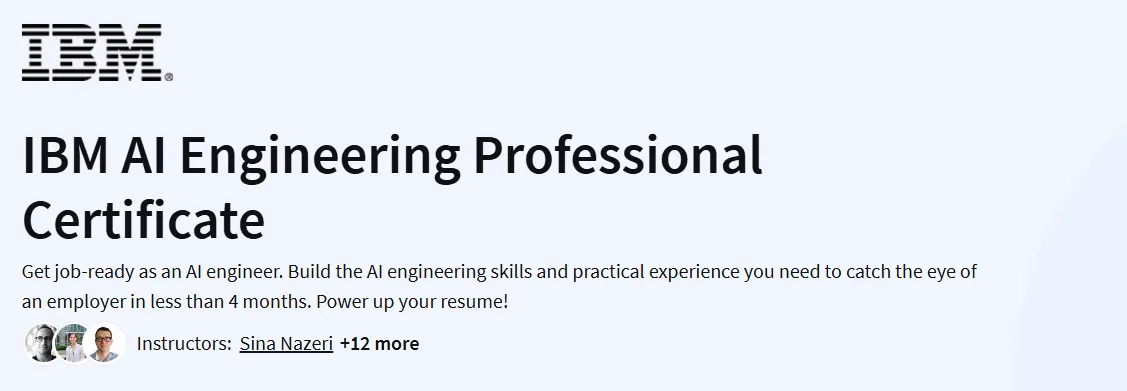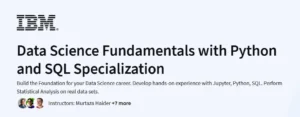What will you learn in this IBM AI Engineering Professional Certificate Course
Understand the fundamentals of machine learning, deep learning, and neural networks.
Implement supervised and unsupervised machine learning models using Python libraries such as SciPy and Scikit-learn.
Build deep learning models and neural networks using Keras, PyTorch, and TensorFlow.
Deploy machine learning algorithms and pipelines on Apache Spark for big data processing.
Develop and fine-tune large language models (LLMs) using frameworks like Hugging Face and LangChain.
Create generative AI applications incorporating Retrieval-Augmented Generation (RAG) techniques.
Gain hands-on experience through labs and projects to showcase your skills to employers.
Program Overview
Course 1: Machine Learning with Python
⏳ 20 hours
- Learn foundational machine learning concepts and implement algorithms using Python and Scikit-learn.
Course 2: Introduction to Deep Learning & Neural Networks with Keras
⏳ 9 hours
- Explore deep learning fundamentals and build neural networks using the Keras library.
Course 3: Deep Learning with Keras and TensorFlow
⏳ 23 hours
- Develop advanced deep learning models using Keras integrated with TensorFlow.
Course 4: Introduction to Neural Networks and PyTorch
⏳ 17 hours
- Implement and train neural networks using PyTorch for various applications.
Course 5: Deep Learning with PyTorch
⏳ 20 hours
- Build and deploy deep learning models using PyTorch, focusing on real-world scenarios.
Course 6: Scalable Machine Learning on Big Data using Apache Spark
⏳ 20 hours
- Learn to scale machine learning tasks on big data sets using Apache Spark.
Course 7: Introduction to Computer Vision and Image Processing
⏳ 15 hours
- Understand computer vision concepts and apply image processing techniques.
Course 8: Natural Language Processing with Classification and Vector Spaces
⏳ 20 hours
- Explore NLP techniques, including text classification and vector space models.
Course 9: Sequence Models and Attention Mechanisms
⏳ 20 hours
- Delve into sequence models and attention mechanisms for advanced NLP tasks.
Course 10: Generative AI: Introduction and Applications
⏳ 7 hours
- Learn about generative AI models and their real-world applications.
Course 11: Generative AI: Prompt Engineering Basics
⏳ 7 hours
- Master prompt engineering techniques to optimize generative AI outputs.
Course 12: Building Generative AI-Powered Applications with Python
⏳ 13 hours
- Develop applications powered by generative AI models using Python.
Course 13: AI Capstone Project with Deep Learning
⏳ 20 hours
- Apply your acquired skills to a comprehensive project, demonstrating your proficiency in AI engineering.
Get certificate
Job Outlook
Completing this certificate prepares you for roles such as AI Engineer, Machine Learning Engineer, Data Scientist, or Deep Learning Specialist.
The skills acquired are applicable across various industries that utilize AI technologies.
Enhance your employability by gaining practical experience in building and deploying AI models and applications
Specification: IBM AI Engineering Professional Certificate
|
FAQs
- Basic knowledge of Python programming is recommended.
- Familiarity with statistics, probability, and linear algebra is helpful.
- Prior AI or machine learning experience is not strictly required.
- The course builds foundational to advanced AI skills progressively.
- Suitable for beginners aiming to become AI engineers.
- Supervised and unsupervised learning algorithms.
- Deep learning models including CNNs and RNNs.
- Generative AI and reinforcement learning basics.
- Model evaluation, optimization, and hyperparameter tuning.
- Deployment of AI models in production environments.
- Includes real-world projects using Python and AI libraries.
- Exercises cover model building, training, and deployment.
- Uses datasets from various domains to simulate industry scenarios.
- Encourages portfolio development for career readiness.
- Provides step-by-step guidance to reinforce learning.
- Python libraries like NumPy, pandas, TensorFlow, Keras, and PyTorch.
- IBM Watson AI and cloud-based AI tools.
- Data visualization tools and workflow management platforms.
- AI model deployment and monitoring platforms.
- Integration of AI solutions into real-world applications.
- AI Engineer and Machine Learning Engineer roles.
- Data Scientist with AI specialization.
- AI consultant for enterprise solutions.
- Roles in automation, predictive analytics, and AI product development.
- Positions in startups, large enterprises, and technology consulting firms.





